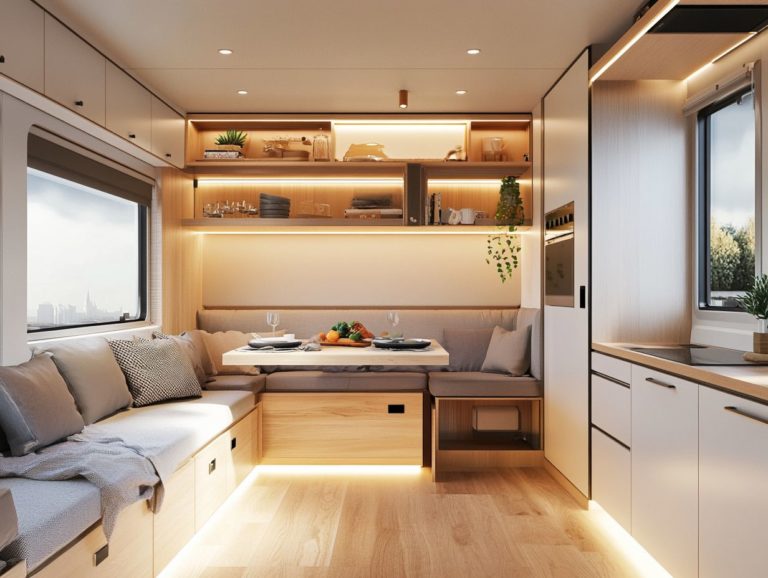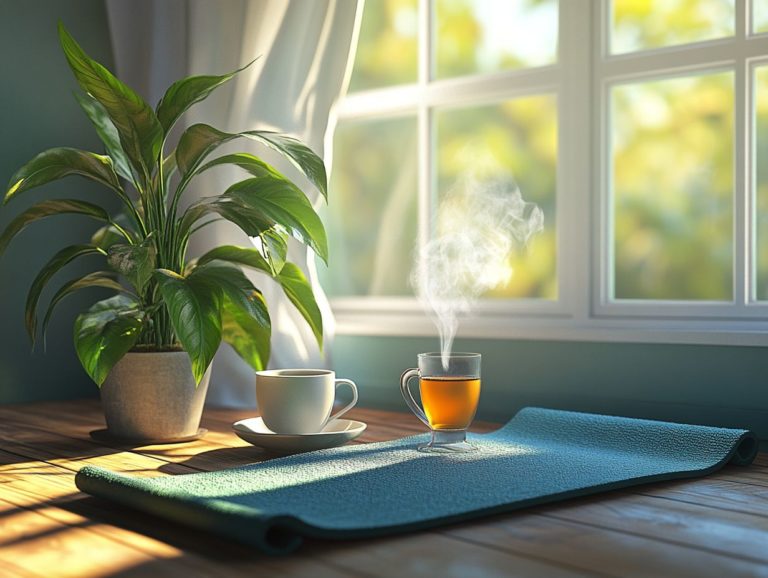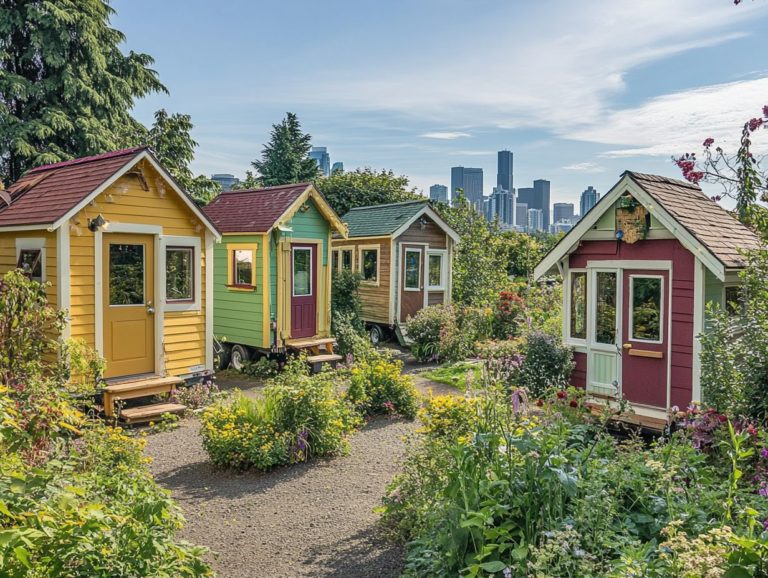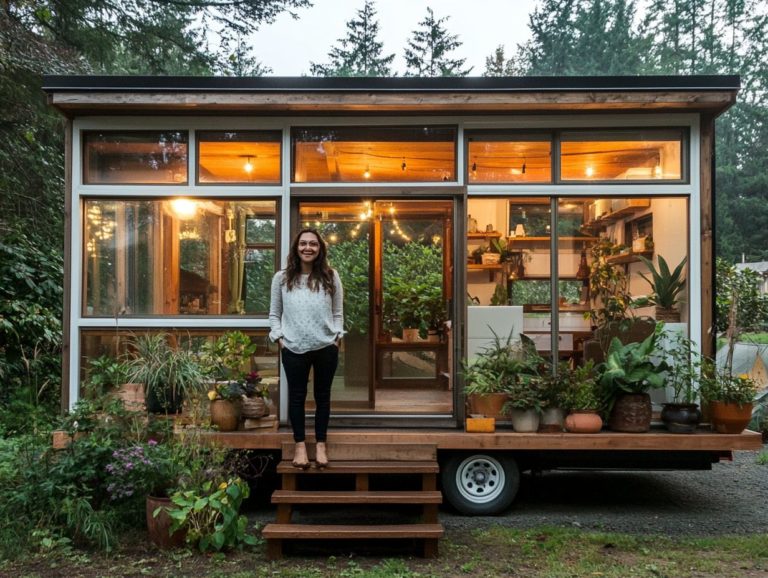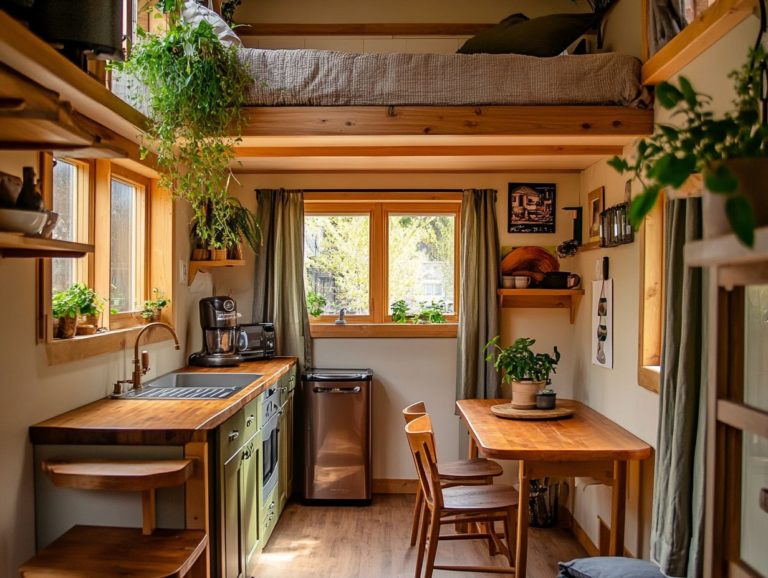5 Essential Skills for Tiny House Dwellers
Living in a tiny house can be both exhilarating and challenging. It requires a unique set of skills that extend far beyond merely downsize living your belongings.
You ll want to explore five essential skills every tiny home dweller should master:
- Resourcefulness
- Organization
- Budgeting
- Basic construction knowledge
- Adaptability
Get ready to explore how to cultivate these skills, the challenges you might encounter, and their broader applications in everyday life, including aspects of financial freedom. Discover the benefits of honing these abilities while debunking some common misconceptions about tiny house living and exploring how to design your tiny house.
Whether you re contemplating a minimalist lifestyle or simply curious about sustainable living, this guide will offer valuable insights to help you thrive in a smaller space.
Contents [hide]
- Key Takeaways:
- 1. Resourcefulness
- 2. Organization
- 3. Budgeting
- 4. Basic Construction Knowledge
- 5. Adaptability
- How Can These Skills Be Developed and Improved?
- Frequently Asked Questions
- What are the 5 essential skills for tiny house dwellers?
- Why is organization important for tiny house dwellers?
- What is minimalism and how does it relate to living in a tiny house?
- How does adaptability play a role in living in a tiny house?
- Why is creativity important for tiny house living?
- How can problem-solving skills benefit tiny house dwellers?
Key Takeaways:
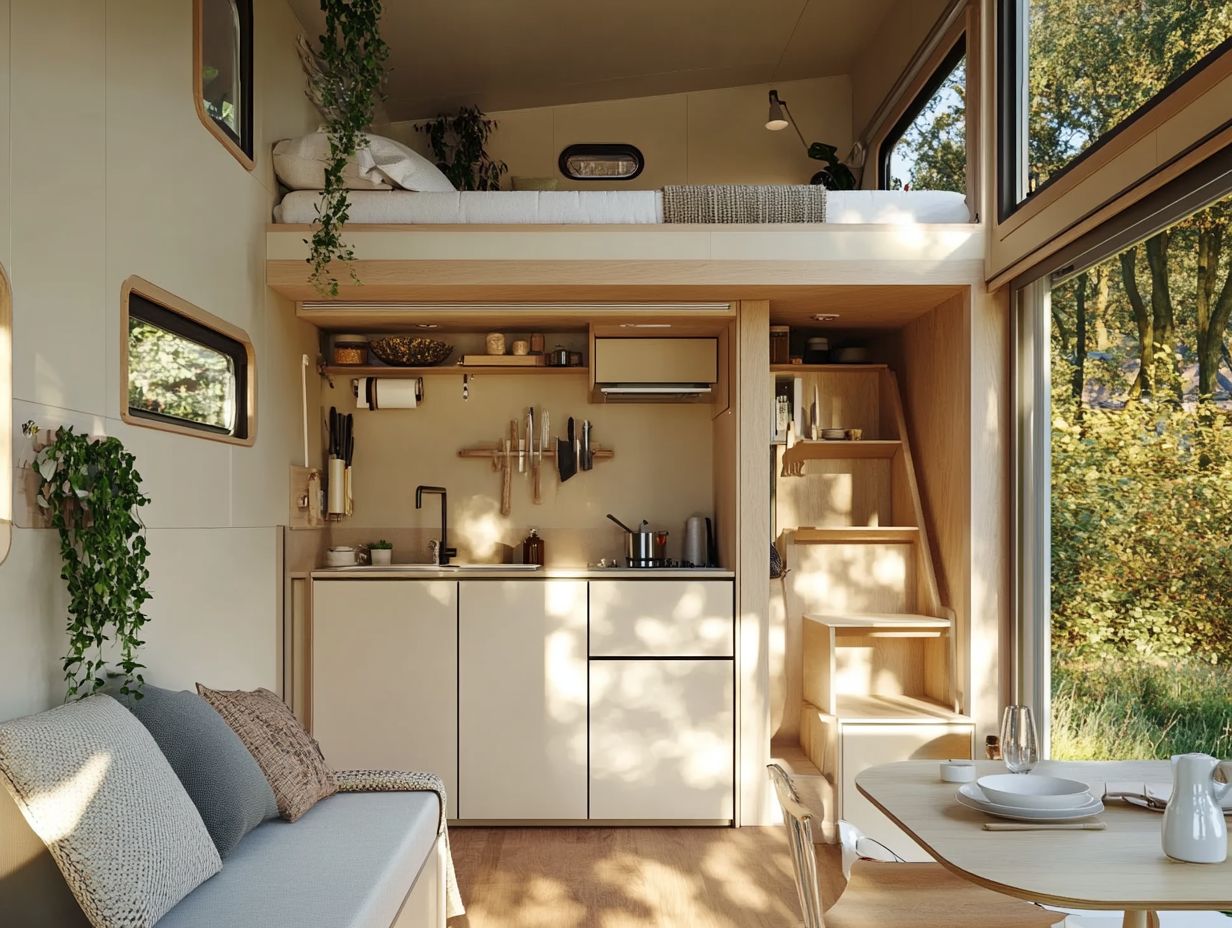
- Resourcefulness is essential for making the most out of your limited space.
- Staying organized keeps your tiny home functional and free of clutter.
- Budgeting is vital for financial stability in your tiny house journey.
1. Resourcefulness
Resourcefulness is a cornerstone of the tiny house movement. It encourages individuals like you to creatively harness available resources for designing your own tiny living space. This approach supports sustainable living and financial freedom through downsizing.
Embracing this innovative spirit challenges conventional living and inspires you to discover unique space-saving ideas. Transform every nook and cranny into functional areas. For example, integrating eco-friendly features such as solar panels and composting toilets minimizes your environmental footprint and illustrates how minimalism can beautifully coexist with sustainability.
Collaborating with local small businesses like Wind River Tiny Homes strengthens community ties. Sourcing materials and services from artisans and suppliers in your area enriches your tiny house experience. This synergy fosters a sense of belonging while showcasing how resourcefulness can connect like-minded individuals in the pursuit of simpler, more intentional lives.
2. Organization
Effective organization is essential when embarking on the journey of designing your tiny house. It ensures that every element, from crafting a mood board to adhering to local regulations, is systematically addressed.
By meticulously planning your layout, you can maximize your living space without sacrificing comfort or functionality. Choosing quality materials is vital for creating a durable and inviting environment. Clever space-saving solutions enable you to embrace a more flexible and adaptive lifestyle.
Effective project management will be your ally in navigating typical obstacles, such as zoning laws and budget constraints. Staying organized and proactive helps you realize your vision and enjoy a significantly smoother building experience.
3. Budgeting
Budgeting is an essential skill for anyone aspiring to build a tiny house. It allows you to achieve financial freedom without sacrificing quality materials and essential building skills.
Mastering proper budgeting techniques is crucial for managing costs tied to the tiny house movement, which promotes simplicity and sustainability. By meticulously breaking down expenses for materials, tools, and labor, you can prioritize your spending and avoid common pitfalls. For instance, investing in high-quality insulation may seem pricey at first, but it significantly reduces utility bills and long-term energy costs. Additionally, consider exploring smart storage solutions for tiny homes to optimize your space effectively.
Creating a detailed financial plan helps you see exactly where every dollar goes. This thoughtful approach not only sparks creativity in your design but also promotes mindful consumption, leading to a more enjoyable and less stressful building experience.
4. Basic Construction Knowledge
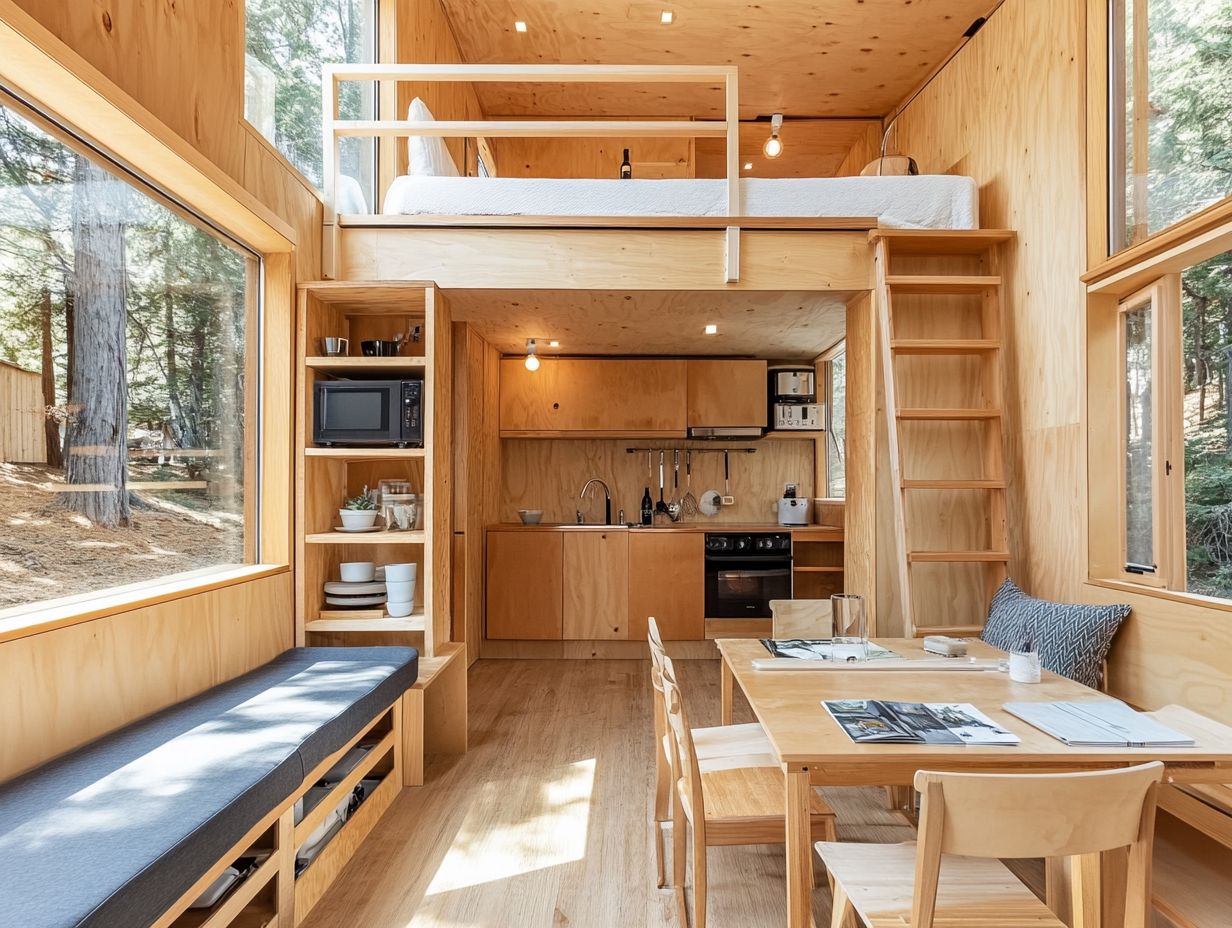
Acquiring basic construction knowledge is invaluable for you as an aspiring tiny house builder from places like Chattanooga, Tennessee. It provides essential insights into plumbing, carpentry, and other critical skills necessary for creating a functional tiny home.
This knowledge empowers you to do practical tasks with confidence! It ensures you can manage your projects from start to finish smoothly. Workshops offered by Big Skills Tiny Homes focus on hands-on learning, letting you engage directly with the tools and techniques vital to the building process. Additionally, you can explore 7 space-saving tips for tiny house families to maximize your living area.
By grasping key construction principles, you enhance your craftsmanship and ensure the strength and stability of your designs. This is particularly important when integrating eco-friendly features like solar panels and composting toilets. This powerful blend of theory and practice deepens your appreciation for constructing a tiny home, guiding you toward 5 strategies for designing a cozy tiny home and more satisfying and sustainable living solutions.
5. Adaptability
Adaptability is an essential trait for anyone embracing the tiny house lifestyle. It allows you to creatively reimagine space-saving ideas and navigate the unique challenges of living in a smaller home within the tiny house community.
This dynamic skill influences your design choices, encourages innovative layouts, and promotes multifunctional furniture. It also shapes your daily experiences as a resident in the tiny house community. Many community members share inspiring stories of transforming challenges like local regulations or limited utilities into opportunities for creativity, including 5 ways to personalize your tiny house design.
For instance, a couple reimagined their outdoor space, turning it into a vibrant garden. This not only provided fresh produce but also became a lively social gathering spot.
Such experiences underscore how embracing flexibility can lead to unique solutions. It fosters a sense of community and resourcefulness that flourishes within this alternative housing movement.
How Can These Skills Be Developed and Improved?
Developing skills like resourcefulness, organization, and basic construction knowledge can be significantly enhanced through participation in tiny house workshops offered by organizations like Big Skills Tiny Homes and Youth Spirit Artworks. These workshops provide practical learning beautifully complemented by hands-on experience in creating mood boards and mastering building techniques.
Besides workshops, exploring online courses opens up flexible learning opportunities. You can dive deeper into specific areas of interest at your own pace. Community events are equally essential. They provide a platform for enthusiasts to gather, share experiences, and learn from each other.
Networking within the tiny house community is invaluable. By connecting with others, you can exchange insights, resources, and best practices. This fosters a collaborative environment that encourages continuous growth and inspiration.
What Are the Challenges of Living in a Tiny House?
Living in a tiny house presents unique challenges. These include navigating local regulations, managing utility bills, and adjusting to the constraints of smaller living spaces.
These hurdles can often feel daunting, especially if you’re new to the tiny house lifestyle. For example, zoning laws can vary significantly from one municipality to another, making it quite the challenge to find a suitable plot of land. However, once you settle in, there are 5 ways to integrate technology into your tiny house to maximize your space and efficiency.
Take Travis Pyke and Brittany Pyke; these seasoned tiny house dwellers encountered similar issues. They found innovative ways to advocate for policy changes within their community in Spur, Texas. Managing utilities can also be a puzzle; they discovered that investing in energy-efficient appliances not only slashed their bills but also diminished their environmental footprint. Additionally, they incorporated 5 tiny house features to maximize functionality in their home.
Their journey underscores the importance of resourcefulness and community engagement in overcoming these common obstacles. They turned challenges into opportunities for growth that many face in places like Walsenburg, Colorado.
Don t miss out on the chance to transform your tiny home dreams into reality! Join workshops, engage with the community, and develop your skills further.
How Can These Skills Be Transferred to Other Aspects of Life?
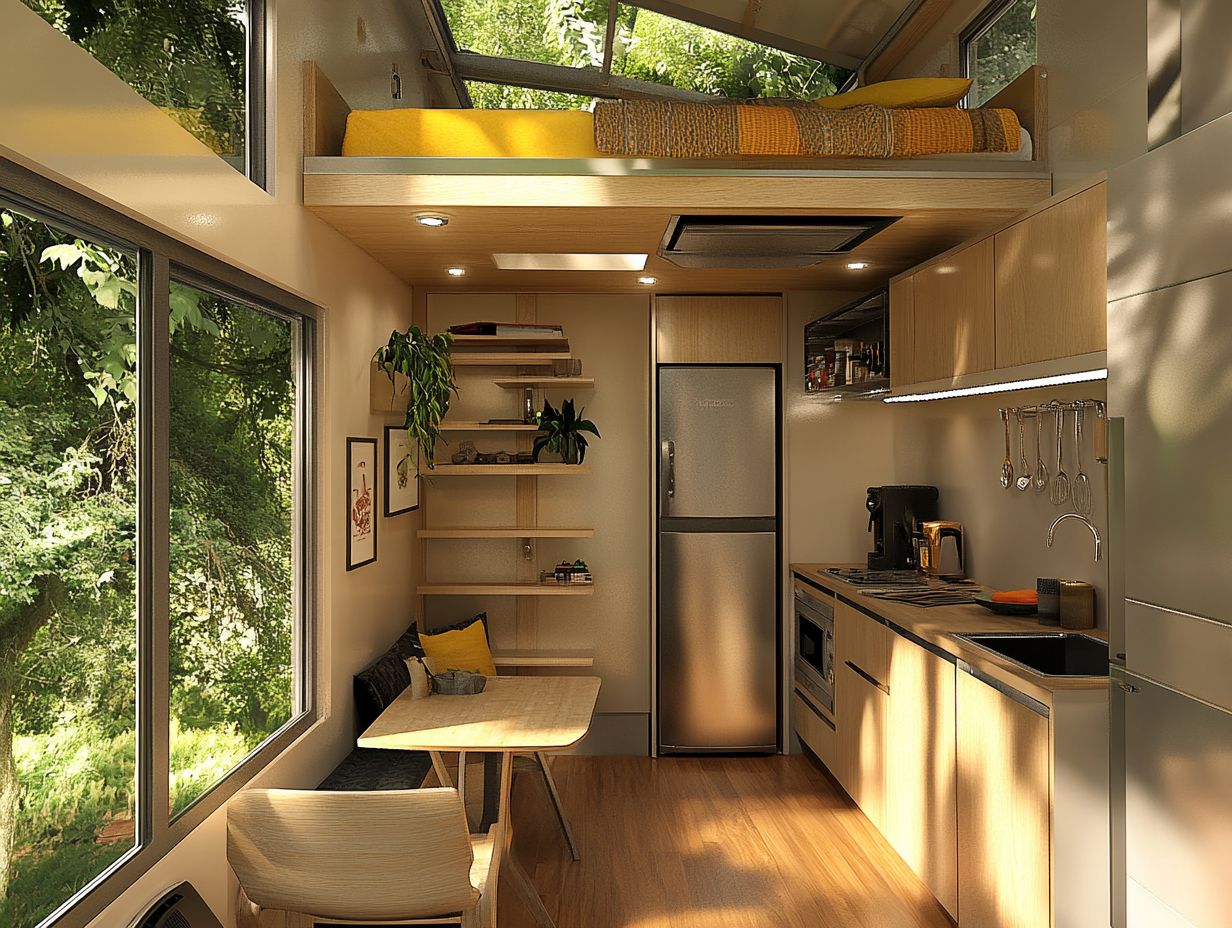
The skills you cultivate while living in a tiny house like resourcefulness, adaptability, and effective budgeting can seamlessly translate into various facets of your life. These skills pave the way for financial freedom and help you embrace a simpler way of life.
One inspiring individual found that her budgeting skills allowed her to chase her dream career in interior design, enabling her to sustain her tiny home while saving for her future. For those living in compact environments, maximizing small spaces can also play a crucial role. Another person shared that the adaptability he developed while adjusting to limited space helped him navigate relationship dynamics more fluidly, enhancing communication with partners and friends.
Community involvement thrives among those who embrace tiny living. They engage in local initiatives, sharing their sustainable lifestyle practices and inspiring others to reconsider their consumption habits. This ripple effect shows just how quickly these lessons can change lives!
What Are the Benefits of Developing These Skills?
Developing skills like budgeting and basic construction knowledge opens up a world of benefits. With these skills, you can select quality materials, gain financial freedom, and incorporate eco-friendly features into your tiny house.
These competencies enable you to make informed decisions that elevate your living space and promote a sustainable lifestyle. For instance, a couple who mastered home improvement skills transformed their tiny house into an energy-efficient sanctuary, significantly slashing their carbon footprint.
By sticking to a well-planned budget, they seamlessly integrated solar panels and rainwater collection systems. This proves that smart financial choices can lead to long-term ecological benefits. Such success stories demonstrate that embracing skill development can pave the way for a healthier environment while enhancing your overall well-being, allowing you to live more intentionally and in harmony with nature.
How Can These Skills Help in Sustainable Living?
The skills you gain from tiny house living are crucial for fostering sustainable living. They enable you to seamlessly incorporate eco-friendly features like solar panels and composting toilets into your home.
By mastering essential skills such as carpentry (working with wood to build things), gardening, and water conservation, you not only elevate your personal living space but also make a meaningful contribution to the environment. For instance, when you implement rainwater harvesting systems, you can significantly cut down on water waste. Growing your own vegetables provides a sustainable food source right at your doorstep. Additionally, exploring 7 ways to create a multi-functional tiny home can further enhance your efforts in maximizing space and resources.
These practices deepen your connection with nature and inspire a commitment to reducing your carbon footprint. Learning to use energy-efficient appliances and ensuring your home is well-insulated further promotes resource conservation, showcasing how skill development can cultivate a more harmonious relationship with the planet.
What Are the Common Misconceptions About Living in a Tiny House?
Many common misconceptions about living in a tiny house arise from misunderstandings surrounding the tiny house movement. You might think that it limits comfort and lifestyle, but in reality, it often fosters financial freedom and lowers utility bills.
Those who embrace this alternative way of living frequently share stories that defy these stereotypes. For instance, many tiny house dwellers report a significant drop in their monthly expenses, allowing them to invest in experiences rather than accumulating material possessions. To maximize this lifestyle, many find that following 5 essential tips for efficient tiny house layouts can greatly enhance their living space.
The compact design encourages a minimalist lifestyle, promoting mindfulness about consumption. A resident of a tiny home in the Pacific Northwest once mentioned how living in a manageable space ignited their creativity and deepened their connection with nature. They also highlighted the importance of incorporating must-have features in your tiny house bathroom, affirming that their overall quality of life has significantly improved.
Listening to such accounts can shift your perception and reveal the enabling aspects of choosing to live in a tiny house.
Frequently Asked Questions
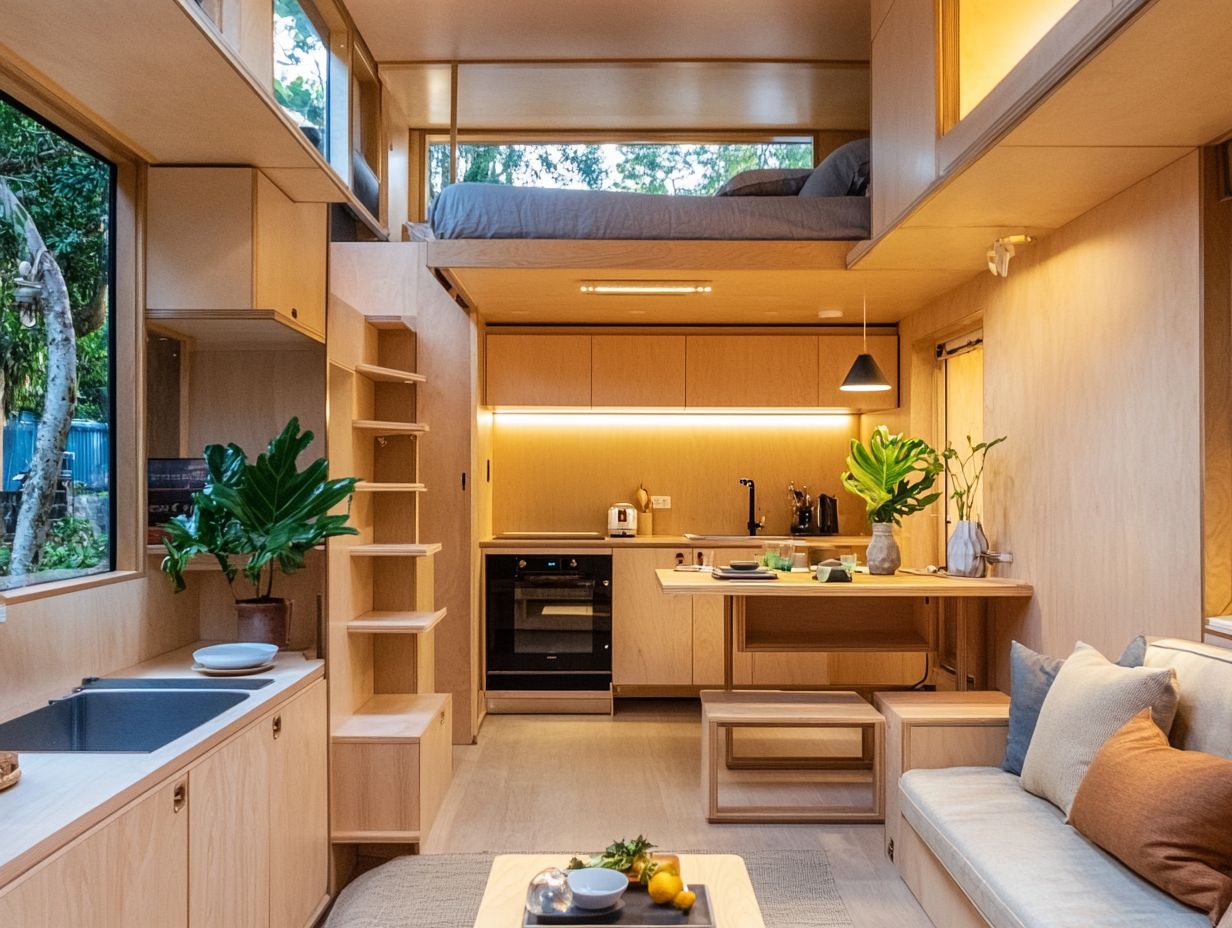
What are the 5 essential skills for tiny house dwellers?
The 5 essential skills for tiny house dwellers are organization, minimalism, adaptability, creativity, and problem-solving.
These skills help you make the most of limited space in a tiny house.
Why is organization important for tiny house dwellers?
Want to feel more at home in your tiny house? Organization is key!
It maximizes your limited space and prevents clutter.
What is minimalism and how does it relate to living in a tiny house?
Minimalism means living with only the essentials and choosing to own less.
In a tiny house, this practice is necessary to downsize and focus on what you truly need.
How does adaptability play a role in living in a tiny house?
Being adaptable helps find solutions in a limited space.
You ll need to adjust to different situations to thrive in your tiny home.
Why is creativity important for tiny house living?
Creativity allows you to find unique ways to utilize your space.
It also helps personalize your tiny house, making it feel like home.
How can problem-solving skills benefit tiny house dwellers?
Problem-solving skills are a must in a tiny house.
Challenges will arise, and thinking outside the box is essential for a successful living experience.

